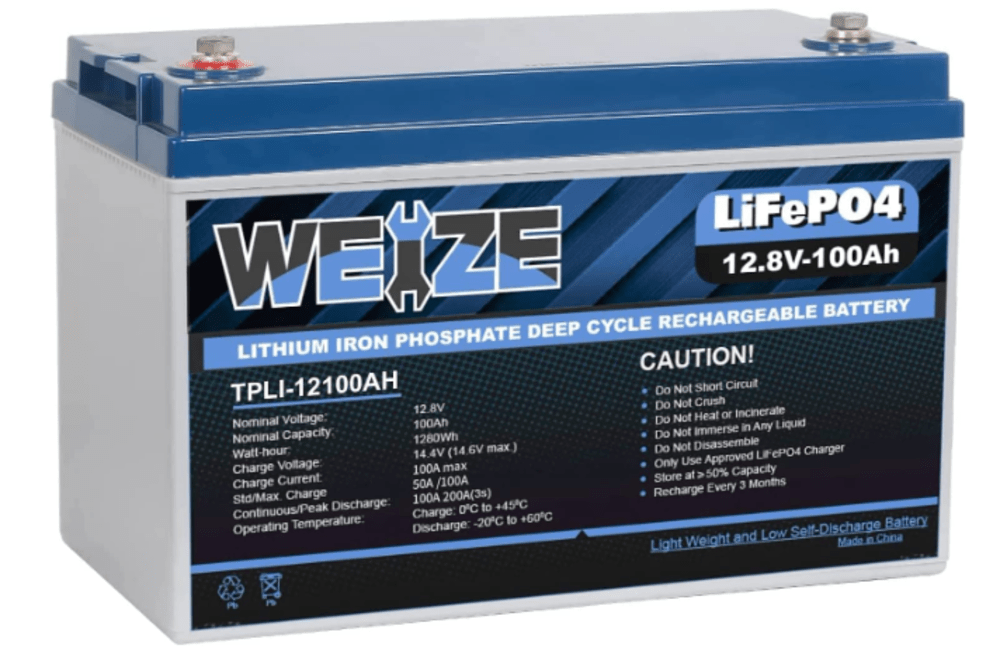A recreational vehicle (RV) needs a 12-Volt RV battery to function, just like every other car on the road.
However, you probably already know how much of a hassle a poor electrical component can be if you own an RV as most owners do.
In this post, I’ll walk you through how to choose a deep-cycle battery for your RV and provide you with some suggestions for batteries that could work for your family’s needs.
The risks are greater when using an RV battery because you’re not just powering a car for a trip to the store.
The deep cycle battery in your RV will be put to the test if you intend to take your family on trips.
The deep cycle battery must perform for you whenever you utilize the gadgets or appliances in your RV.
What Is an RV Battery and How Does It Work?
A minimum of two batteries are often present in recreational vehicles. In a perfect world, the car would have a separate battery that was used for the ignition or starter.
When this happens, the car battery has to have a great cold cranking amp (CCA), which is the amount of power needed to start the automobile in freezing and inclement weather.
Batteries for cars, trucks, and motorcycles all need to have CCA.
The lighting system, inboard appliances, RV solar panels, and entertainment system are just a few of the numerous applications that will be powered by the other batteries in the RV.
They are sometimes referred to as home batteries for this reason.
Although they are essential if present in the battery to act as a backup in case the primary battery fails, cold cranking amps are useless as these batteries are not utilized to start an engine.
RV batteries come in a variety of forms because they offer a consistent power supply for a long period.
Due to this, house RV batteries should be able to withstand deep cycles and are measured in amp hours (Ah) rather than CCA-like starting batteries.
Depending on how much electricity you require for your RV, the amp hour rating may change.
Therefore, install additional batteries in series aboard a ship with many appliances and restricted access to a power source for lengthy trips to assure simultaneous usage of several inboard applications.
What To Look For In An RV Deep Cycle Battery
Deep cycle batteries can function better in a variety of circumstances since they are made to endure more cycles of discharging than standard car batteries.
Deep cycle batteries are different from standard automotive batteries in that they only need to drain while the engine is off to start the engine and power the car’s electronics.
However, after a certain number of cycles, the battery’s maximum capacity decreases, making features unique to RV deep cycle batteries different from those of standard car batteries.
Shelf Life
Batteries are known to be ruined by RVs. This is due to the high self-discharge rates of many RV batteries. When a battery self-discharges quickly, it loses power even when no appliances are using it.
Because of this, one of the most frequent problems with deep cycle batteries for RVs is that they lose charge between uses. This is particularly true in warmer regions, where high temperatures amplify the self-discharge that all batteries experience.
Along with the problem of RV batteries dying after extended periods of inactivity, RV batteries are also known to lose their full charge capacity quickly over time.
While the poorest RV deep cycle batteries might only guarantee a year or two of the maximum capacity claimed on the box, the best have a shelf life of about 10 years before starting to lose maximum capacity.
Capacity
One of the most crucial components of an RV battery is its capacity, which affects how long you can run your appliances on battery power alone. Ampere-hours, which you will see recorded as Ah, are used to assess capacity.
The range of deep cycle batteries ranges from around 50 Ah to 200 Ah or more. The key point to keep in mind is that you will need more capacity for the more appliances you want to utilize simultaneously.
You may get by with a lesser battery capacity if your RV’s sole intended uses are the stove and lighting.
A bigger capacity battery is a preferable option, though, if you want to operate many appliances at once and don’t want to worry about running out of battery power in the middle of the night.
Voltage
When shopping for RV batteries, you’ll discover that some have 12 volts while others only have 6 volts.
Car batteries have a standard voltage of 12 volts. Typically, a 12-volt battery is required to power almost any electronic device.
Only the option to connect your batteries in parallel and series is offered by 6-volt batteries.
Two batteries will be required if you purchase a 6-volt RV battery, and they should be connected in parallel to increase the voltage to 12.
Compared to 12-volt RV batteries, some 6-volt RV batteries provide stronger amps at a lower cost. They frequently have thicker plates, making them more robust as well.
Durability
Because the internal mechanisms are more complex and delicate, deep-cycle batteries usually have a shorter lifespan than normal RV batteries.
To reduce internal cycling from cell to cell when there is no need for power, several manufacturers include advanced battery cell cycling technologies in their deep cycle batteries.
The top deep-cycle battery producers build their batteries with heavier and more complete protective casings to make up for the added complexity.
Conversely, less reliable producers cut corners with protective casings, leaving the batteries susceptible to harm that might result in harmful acid spills.
You should try to pick a battery that is extremely resilient, given that a battery acid leak in your RV might result in significant harm.
You should never physically or mechanically harm your RV battery. But you should still search for a strong battery because it’s better to be cautious than sorry.
Now that you are aware of the essential characteristics of RV deep cycle batteries, let us walk through our 5 best picks for the best RV deep cycle batteries. This will give you some ideas for potential purchases when the time comes to go shopping.
The 5 Best 12-Volt RV Battery Reviews
5Universal Battery Sealed, Lead-Acid 12-volt RV Battery

Beginning at No. 5 in my pick of the Best 12-Volt RV Battery is the “Universal Battery Sealed, Lead-Acid 12-volt RV Battery“
RV campers who just need to forgo using a generator for a recharge for one or two nights can choose the Universal Battery sealed, lead-acid 12-volt RV battery.
Campers should anticipate being able to complete the essentials and possibly a little more throughout a brief journey thanks to its dependable and steady power in a two-battery inline system.
A major drawback of this device is that the battery can suffer in really cold weather, especially if you camp somewhere that gets chilly or use it for late-fall hunting.
Even though it can withstand low temperatures of five degrees, it won’t charge if the temperature is below freezing.
But overall, because of its sealed and leak-proof design, it’s a relatively affordable and ecologically beneficial product.
And although it is still an expensive purchase, it is a good one, especially when compared to the majority of RV batteries on the market.
Specifications Of Universal Battery Sealed, Lead-Acid 12-volt RV Battery
- Dimensions: 12.97 inches x 6.89 inches x 9.32 inches
- Weight: 65.7 pounds
- Voltage: 12.0 volts
- Size: 110 Ah
- Battery Description: Lead Acid
Pros
- Provides enough energy to run a modest RV for two days.
- It only loses 36% of its power capacity after a year of maintenance-free storage.
- cheaper than the majority of rivals.
Con
- Although it can efficiently power a coach, it probably won’t last more than 20 hours without a charge.
- It is too heavy.
4Interstate Batteries 12V 35AH Sealed Lead Acid AGM Deep Cycle Battery

“Interstate Batteries 12V 35AH Sealed Lead Acid AGM Deep Cycle Battery” is No. 4 in my pick of the Best 12-Volt RV Battery.
The ideal battery for scooters and wheelchairs is the Interstate Batteries 12V 35Ah Deep-Cycle Battery, since it is designed exclusively for these uses.
It also has a long lifespan for deep discharge applications. We concluded that Interstate RV batteries are the finest deep-cycle batteries for RVs as a result of this.
You may obtain a large number of cycles from this deep-cycle battery in a small package.
Specifications Of Interstate Batteries 12V 35AH Sealed Lead Acid AGM Deep Cycle Battery
- Dimensions: 5.16″D x 7.68″W x 6.42″H
- Weight: 22.9 pounds
- Voltage: 12.0 volts
- Size: 35Ah
- Battery Description: AGM Deep Cycle Battery
Pros
- It is available in three amp-hour ratings: 35, 55, and 75 Ah.
- Additionally, it has VRLA technology to stop spills and overpressurization.
- It was designed especially for wheelchairs and scooters.
Con
- It has a very limited capacity.
- Not very robust
3Renogy 12 Volt Deep-Cycle AGM Battery: Best 12 Volt RV Battery

Taking the 3rd spot in my pick of the Best 12-Volt RV Battery is “Renogy 12 Volt Deep-Cycle AGM Battery“
Because of its high tolerance for freezing temperatures, 100 Ah of capacity, and simple installation, Renogy’s Deep Cycle AGM Battery is one of the best 12-volt RV batteries, even under $300.
You won’t have to be concerned about fractures brought on by frequent heating and cooling cycles if you use this battery for your RV.
The Renogy is a great option since it can start cold without having any problems, making it ideal if you want to use your RV in really cold climates.
Installation is significantly simplified by the battery’s handy carrying handles.
The Renogy 12V Deep Cycle AGM Battery is an excellent option for RVs and other applications if you’re searching for a high-performing battery that is dependable and designed with practicality in mind.
With solar energy storage applications in mind, the leak-proof construction was created for ruggedness and severe use. This ensures that it will operate well even in subzero temperatures.
Additionally, it has an improved electrolyte mix that guarantees consistent battery capacity and outstanding discharge performance, even in colder climates.
Your off-grid solar system or car will continue to run on electricity thanks to this Renogy 12V Deep-Cycle AGM Battery.
Since it is built of high-purity materials and has a low monthly self-discharge rate of < 3% at 77°F, which is 5 times lower than its flooded equivalents, it also has a long shelf life.
The Renogy Deep-Cycle AGM Battery is the greatest 12-volt RV battery thanks to these exceptional characteristics.
Specification Of Renogy 12 Volt Deep-Cycle AGM Battery
- Dimensions: 13.1 x 6.9 x 8.6 inches
- Weight: 63.9 pounds
- Voltage: 12.0 volts
- Size: 100Ah
- Battery Description: Deep Cycle AGM Battery
Pros
- It has an extended shelf life.
- This battery has an improved electrolyte mix that guarantees steady battery capacity and great discharge performance in cold environments.
- It is a green energy battery constructed entirely from clean, nontoxic, and renewable energy.
Con
2Weize 12V 100Ah LiFePO4

No. 2 in my pick of the Best 12-Volt RV Battery is “Weize 12V 100Ah LiFePO4“.
The Weize 12V 100Ah LiFePO4 can last for more than 2,000 cycles at 100% depth of discharge or 8,000 cycles at 50% depth of discharge.
Since lead-acid batteries only last two years, this lithium iron phosphate (LiFePO4) battery will last five times longer.
The deep cycle RV battery is not vulnerable to thermal runaway or overheating since it is produced from safe, non-toxic, and non-hazardous energy.
The integrated Battery Management System (BMS) protects your battery against overcharging, overcurrent, short-circuiting, and extremes in low and high temperatures, resulting in improved performance and longer life.
Moreover, it shuts off the battery and lowers the voltage to below 1 volt automatically, allowing it to reawaken after a second without needing a higher voltage input.
Lithium batteries are perfect for 12V Deep Cycle applications, including fish finders, ice fishing, camping, solar systems, home alarm systems, and e-scooters, since they are lightweight, adaptable, and have a higher energy density.
Avoid charging numerous batteries in series or parallel, and always use a specialist lithium battery charger.
Specification Of Weize 12V 100Ah LiFePO4
- Dimensions: 13 x 6.77 x 8.46 inches
- Weight: 26.4 pounds
- Voltage: 12.0 volts
- Size: 100Ah
- Battery Description: Lithium-Ion
Pros
- Ability to do a million cycles
- Quick-charging technology
- Miniature form factor
- Excellent performance in both cold and heat
Con
- Has a normal capacity of 100 Ah only.
- Nothing is supplied for mounting.
1Battle Born Batteries LiFePO4

Coming in first as the overall best in my pick of the Best 12-Volt RV Battery is the “Battle Born Batteries LiFePO4“.
The energy used to create the Battle Born Batteries LiFePO4 is entirely secure, environmentally friendly, non-toxic, and renewable.
This lithium-ion battery is a terrific alternative for RVers or even people who only need a new golf cart battery because it can be put in any position.
This lithium-ion battery bank has a longer lifespan and is more affordable than lead-acid batteries.
The lithium-ion technology at the heart of the The LiFePO4 Deep Cycle battery is born to face the ravages of time.
This deep-cycle lithium battery’s built-in Battery Management System, or BMS, technology serves as its brain.
Moreover, it helps in controlling power consumption and turns the system off automatically to safeguard both you and the Li-ion cells from hazardous operating situations.
The 29-pound, acid-free structure is flexible enough to be used in a variety of settings, including RVs, golf carts, campers, off-road vehicles, and off-grid applications.
Additionally, the battery is created from only safe, non-toxic, and sustainable energy sources.
The Battle Born LiFePO4 Deep Cycle Battery is our top choice for the finest lithium battery for RVs due to its exceptional lifetime and enough power.
Specification Of Battle Born Batteries LiFePO4
- Dimensions: 12.75 x 6.88 x 9 inches
- Weight: 29 pounds
- Voltage: 12.0 volts
- Size: 100Ah
- Battery Description: Lithium-Ion
Pros
- Comes with integrated BMS technology for the best possible performance and safety.
- Has outstanding durability and a 10-year guarantee.
- It is an environmentally friendly battery that is entirely safe, non-toxic, and regenerative.
Con
- This battery is very expensive
- It has no handle for carrying
Best 12-Volt RV Battery: FAQ
1. What is the most common RV battery?
AGM (Absorbent Glass Mat) batteries, gel batteries, and conventional flooded electrolyte batteries are the three most popular types of RV batteries.
2. How long does the average 12-volt RV battery last?
The typical lifespan of a 12-volt Gel or AGM battery is up to six years if kept charged while not in use. At an average ambient temperature of 25 oC throughout five or six years of float voltage, the battery still has 80% of its initial capacity.
3. How long can a 12V battery run a TV?
My test suggests that a TV can often operate continuously for 15 to 20 hours on a 12 V, 100 Ah lithium battery. Additionally, given that lead acid batteries can only be depleted to 50%, I would anticipate a 12V, 100Ah lead acid battery to survive for 7 to 10 hours of continuous watch time.
4. How many hours will an RV battery last?
A 100-AH lead-acid battery is standard in most RVs. These batteries can usually keep an RV’s basic necessities (lights and a water pump) running for around 24 hours.
5. What is the proper RV battery voltage?
A decent RV battery has to be 12.7 volts or above. Any less than that needs replacement or recharge, depending on the situation. If your RV battery has less voltage than the recommended range of 12.4 to 12.8 volts, it could be time for a replacement.
6. How long can an RV run without being plugged in?
Batteries are often required to supply electricity while the RV is not connected. A 12 volt battery will last 1-2 days when used normally for lighting, a propane refrigerator, charging phones, etc., and a water pump.
Best 12-Volt RV Battery: My Final Thoughts
It might sound too thrilling to travel in a recreational vehicle (RV). Everyone may enjoy a world of high-adrenaline thrills, pleasure, and enjoyment when they get the chance to embark on an RV trip with their loved ones.
Therefore, it’s important to plan for the trip to guarantee that the next experience will go well and without worry. Otherwise, unplanned malfunctions like a dead RV battery can force you to cut short your trip.
Here is a brief shopping guide for RV batteries to get you started on the correct path if you’re seeking the best RV battery.
As a result, we have put together a thorough buying guide for the Best 12-Volt RV Battery that will enable you to choose the best item without going over budget.
I hope you found this buying guide helpful.
Kindly share your thoughts with us by filling out the “Leave A Reply” form at the end of this page.
Further Reading And References
outdoorlife.com: The Best RV Batteries for Dry Camping






